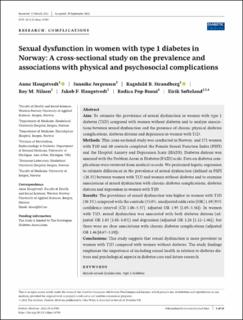Sexual dysfunction in women with type 1 diabetes in Norway: A cross-sectional study on the prevalence and associations with physical and psychosocial complications
Haugstvedt, Anne; Jørgensen, Jannike; Strandberg, Ragnhild B.; Nilsen, Roy M.; Haugstvedt, Jakob F.; Pop-Busui, Rodica; Søfteland, Eirik
Journal article, Peer reviewed
Published version

Åpne
Permanent lenke
https://hdl.handle.net/11250/2979521Utgivelsesdato
2022Metadata
Vis full innførselSamlinger
- Faculty of Medicine [31]
- Registrations from Cristin [9791]
Sammendrag
Aim
To estimate the prevalence of sexual dysfunction in women with type 1 diabetes (T1D) compared with women without diabetes and to analyse associations between sexual dysfunction and the presence of chronic physical diabetes complications, diabetes distress and depression in women with T1D.
Methods
This cross-sectional study was conducted in Norway, and 171 women with T1D and 60 controls completed the Female Sexual Function Index (FSFI) and the Hospital Anxiety and Depression Scale (HADS). Diabetes distress was assessed with the Problem Areas in Diabetes (PAID) scale. Data on diabetes complications were retrieved from medical records. We performed logistic regression to estimate differences in the prevalence of sexual dysfunction (defined as FSFI ≤26.55) between women with T1D and women without diabetes and to examine associations of sexual dysfunction with chronic diabetes complications, diabetes distress and depression in women with T1D.
Results
The prevalence of sexual dysfunction was higher in women with T1D (50.3%) compared with the controls (35.0%; unadjusted odds ratio [OR] 1.89 [95% confidence interval (CI) 1.06–3.37]; adjusted OR 1.93 [1.05–3.56]). In women with T1D, sexual dysfunction was associated with both diabetes distress (adjusted OR 1.03 [1.01–1.05]) and depression (adjusted OR 1.28 [1.12–1.46]), but there were no clear associations with chronic diabetes complications (adjusted OR 1.46 [0.67–3.19]).
Conclusions
This study suggests that sexual dysfunction is more prevalent in women with T1D compared with women without diabetes. The study findings emphasize the importance of including sexual health in relation to diabetes distress and psychological aspects in diabetes care and future research.
